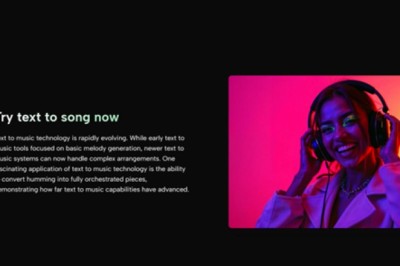views

The Art and Science of Marketing
Digital marketing has always embraced creativity while supporting it with technology. From traditional display ads and search engine optimization (SEO) to the more recent rise of chatbots, virtual reality, and voice search, marketers today are striking the right balance between the two. As both creativity and technology continue to evolve, the role of artificial intelligence (AI) is becoming increasingly prominent in shaping the digital marketing landscape.
The Age of AI: How Artificial Intelligence is Transforming Marketing
In recent years, we have witnessed tremendous advancements in AI technology, and the potential for this technology to revolutionize the marketing industry has been recognized. By harnessing the capabilities of AI, marketers can gain an improved understanding of their target audiences, deliver more personalized content, enhance their abilities to make informed decisions and automate various processes.
AI-driven marketing can deliver tangible benefits such as reduced manual labor, enhanced conversion rates, increased returns on investments, and greater customer satisfaction. However, it's important to note that AI is a double-edged sword, as it can also bring ethical dilemmas and privacy concerns.
At the core of AI-driven marketing lies a unique balance between creativity and technology. The key to this balance lies in understanding how AI augments human creativity and intuition while mitigating the risks associated with AI-driven decision-making.
Creativity and Automation: How to Leverage AI to its Fullest Potential
Utilizing AI in digital marketing should elevate human creativity and not undermine it. There are several ways marketers can effectively deploy AI while preserving their creative instincts:
1. Data-driven decisions
AI-driven analytics can help marketers understand their target audience better, leading to more effective strategies. AI can provide valuable insights into customer preferences, search behavior, and purchasing habits, which can significantly improve marketing campaigns and inspire creative ideas.
2. Personalized content
AI-powered content is not just about automating the creation of generic messages. Instead, it's about leveraging data-driven insights to design bespoke, targeted messages. By using AI algorithms to analyze customer data, marketers can tailor content that speaks directly to individual users' preferences. Harnessing the power of AI to create real quality content enables a personalized experience, building a deeper connection with users and cultivating customer loyalty.
3. Enhanced customer segmentation
AI can help marketers segment their target audiences even more effectively, an essential aspect of personalization. By understanding different customer personas in greater detail, marketers can create cohesive campaigns that resonate with specific audience segments, maintaining a balance between targeting and creativity.
4. Process automation
AI can be used to automate several digital marketing processes, freeing up time for marketers to flex their creative muscles. Examples include chatbot development, social media management, and email marketing.
Leveraging AI Ethically: The Challenges and Responsibilities
Despite the benefits, many challenges are presented when it comes to integrating AI into the digital marketing landscape. Marketers must strike a balance between harnessing AI's advantages and addressing potential ethical concerns such as data privacy and transparency.
An ethical and responsible approach to AI-driven marketing could include:
1. Transparency and disclosure: Companies must be transparent about their use of AI and should disclose to customers when they are interacting with AI-powered tools like chatbots. This maintains trust and shows ethical behavior.
2. Data privacy: Ensuring the protection of customer data is a critical aspect of ethical AI usage. This involves closely adhering to data protection guidelines and regulations, such as the General Data Protection Regulation (GDPR).
3. Ethical use of AI: Companies must invest in ensuring that AI algorithms are built on fair and unbiased principles. This may involve setting up guidelines for AI development teams, validating AI models on a timely basis, and addressing any ethical concerns that arise.
Conclusion: Finding the Perfect Balance
The digital marketing landscape will continue to evolve with the increasing role of AI in various aspects. Balancing creativity and technology is essential to harness the full potential of AI-driven marketing while maintaining ethical standards. Marketers should embrace the unique capabilities of AI to amplify their creativity, improve decision-making, and optimize their strategies. Meanwhile, organizations must prioritize transparency and ethical AI development to build consumer trust and deliver truly exceptional, personalized marketing experiences.





















Comments
0 comment